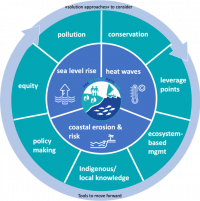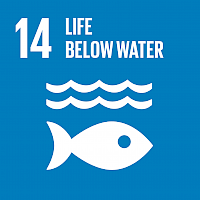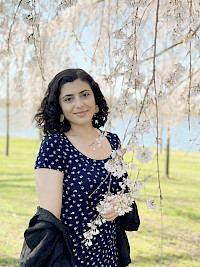1st LENS workshop

The Landscape Exchange Network for Socio-environmental systems (LENS) had its first workshop May 4–6 at the National Socio-Environmental Synthesis Center (SESYNC) in Annapolis, Maryland. This is the first in-person workshop hosted by the Integration and Application Network since the pandemic started, although some joined us virtually for the presentations.
On the first day of the meeting, participants from various institutions across the U.S. visited a stream restoration project and a managed field within the National Ecological Observatory Network (NEON) Airborne Observation Platform (AOP) site at the Smithsonian Environmental Research Center (SERC). Back at SESYNC, participants heard from various speakers and took part in breakout sessions to discuss translational ecology approaches, identify data and methods relevant to socio-environmental systems, and to discuss the future of LENS. Having only met virtually for the past two years, the kitchen at SESYNC bubbled with conversation as participants had coffee and shared their passion for the interaction between the natural and social systems. Parts of the event will be posted to the LENS website. LENS is an NSF Research Coordination Network that hopes to support research that integrates the high-resolution remotely sensed data from the NEON AOP to address socio-environmental research questions. If you want to learn more about LENS visit our website and consider subscribing to our newsletter.
Pacific Ocean Pathways Project Science-Society Council Meeting

The Pacific Ocean Pathways project (PACPATH) is a Collaborative Research Action supported by the Belmont Forum to develop sustainability pathways for Sustainable Development Goal 14 (Life Below Water) in Pacific Island Countries. As a transdisciplinary project, our most important imperative is to work closely with stakeholders to design the research program, so that results are relevant to local interests. The PacPath Science-Society Council (SSC) met in April to create consensus about the project scope. The SSC has stakeholder representation from numerous Pacific Island Countries; during the meeting, SSC participants selected Marine Heat Waves, Coastal Erosion, and Sea Level Rise as primary topics. Stakeholders will explore these topics our first workshops in October 2022.
University of the South Pacific Seminar on SDG 14 Indicators for Pacific Island Countries

Heath Kelsey provided a virtual seminar to the faculty and students at the University of the South Pacific on co-developing developing indicators related to Sustainable Development Goal 14 (Life Below Water) in Pacific Island
Countries. The seminar is part of the Pacific Ocean Pathways project (PACPATH). We discussed approaches for co-developing indicators that are relevant to local concerns, and some issues related to applying SDG targets
and indicators at local scales. The SDGs are a global initiative, so targets and indicators may not always be relevant to local issues. Mapping locally-derived and SDG indicators may help streamline efforts to report on SDG progress, while also providing useful information to local management.
Welcome, Lili!

Hi, my name is Lili Badri. I'm originally from Alabama, where I graduated from the University of South Alabama with a B.S. in Chemistry. Afterwards, I attended SUNY-ESF in Syracuse, NY where I earned my M.S. in Environmental Science this past December. My previous research experiences mostly focused on dissolved organic matter (DOM) characterization and dynamics. My science background has given me a greater understanding of the importance of scientific communication, and I'm looking forward to strengthening my communication knowledge and skills during my time at UMCES IAN.

